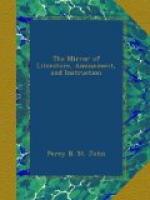The following rules may generally be relied upon, at least to a certain extent:
1. Generally the rising of the mercury indicates the approach of fair weather; the falling of it shows the approach of foul weather.
2. In sultry weather the fall of the mercury indicates coming thunder. In winter, the rise of the mercury indicates frost. In frost, its fall indicates thaw; and its rise indicates snow.
3. Whatever change of weather suddenly follows a change in the barometer, may be expected to last but a short time. Thus, if fair weather follow immediately the rise of the mercury, there will be very little of it; and, in the same way if foul weather follow the fall of the mercury, it will last but a short time.
4. If fair weather continue for several days, during which the mercury continually falls, a long continuance of foul weather will probably ensue; and again, if foul weather continue for several days, while the mercury continually rises, it long succession of fair weather will probably succeed.
5. A fluctuating and unsettled state in the mercurial column indicates changeable weather.
The domestic barometer would become a much more useful instrument, if, instead of the words usually engraved on the plate, a short list of the best established rules, such as the above, accompanied it, which might be either engraved on the plate, or printed on a card. It would be right, however, to express the rules only with that degree of probability which observation of past phenomena has justified. There is no rule respecting these effects which will hold good with perfect certainty in every case.
This volume, we should add, is by Dr. Lardner, the editor of the Cyclopaedia, and is a good model for his collaborateurs.
* * * * *
REFLECTION.
It is better to reflect ourselves, than to suffer others to reflect for us. A philosopher has a system; he views things according to his theory; he is unavoidably partial; and, like Lucian’s painter, he paints his one-eyed princes in profile.
* * * * *
[Illustration: STATUE OF PETER THE GREAT.]
This superb work of modern art stands in one of the finest squares of St. Petersburgh, and of Europe, according to Sir Robert Ker Porter. It was erected by command of the Empress Catherine, and, like all her projects, bears the stamp of greatness. The name of the artist is Falconet: “he was a Frenchman; but,” adds Sir R.K.P. “this statue, for genius and exquisite execution, would have done honour to the best sculptors of any nation. A most sublime conception is displayed in the design. The allegory is finely imagined; and had he not sacrificed the result of the whole to the prominence of his group, the grand and united effect of the statue and its pedestal striking at once upon the eye, would have




